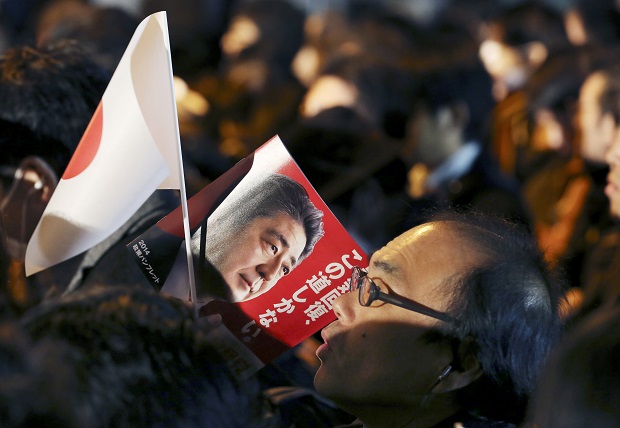
A supporter of the ruling Liberal Democratic Party holds Japan’s national flag and the party’s leaflet during an election campaign by Prime Minister Shinzo Abe in Tokyo, one day before Parliament’s lower house election, Saturday, Dec. 13, 2014. Prime Minister Abe is counting on a landslide victory in parliamentary elections Sunday that will likely return his ruling coalition to power with an even bigger majority, empowering him to pursue an ambitious agenda of political and economic reforms. The words on the leaflet read: Theres no other ways for economic recovery but our way. AP
TOKYO, Japan – Voters began casting ballots in Japan on Sunday for a general election likely to return Prime Minister Shinzo Abe to power, and billed as a referendum on his economic policy.
Polling stations opened at 7:00 am (2200 GMT Saturday) across the nation in a lower house election, officials said.
The vote count starts Sunday night, with broadcasters’ exit polls expected soon afterwards.
The premier is seeking a greater mandate for “Abenomics” — his signature plan to fix the economy — and observers expect he will barely break a sweat in an easy victory.
Opinion polls predict his ruling Liberal Democratic Party (LDP) and its junior partner Komeito will sweep the ballot, all but unhindered by an unprepared and underwhelming opposition.
“I have been pushing for Abenomics, the policies designed to create jobs and raise salaries,” Abe told hundreds of voters in Tokyo’s neon-lit Akihabara electronics district on the eve of the election.
“Japan can be much richer,” Abe said firmly in his last stump speech, sporting a white windbreaker. “Please let our coalition have power.”
Early opinion polls have shown the premier’s coalition is likely to secure more than 300 of the 475 contested seats, giving them the super-majority they need in the powerful lower house to force through legislation.
The main opposition Democratic Party of Japan, whose haphazard governance over the three years until 2012 left voters cold, could add a couple of dozen more seats to its tally of 62, but will remain ineffective, according to the surveys.
Heavy snow hit large swathes of Japan early Sunday, and the poor conditions could put off already unenthusiastic voters and push turnout to a record low for the elections.
Sixty-year-old Abe still had more than two years left of his term when he called the vote last month.
His two years in power have been characterized by a bid to reinvigorate Japan’s sagging economy with what he has called the “three arrows” of Abenomics — monetary easing, fiscal stimulus and structural changes.
The first two arrows have largely hit their target — the once-painfully high yen has plunged, sending stocks higher.
And prices have begun rising after years of standing still, proof, say Abe’s acolytes, that this is the beginning of a virtuous circle of economic growth, with higher wages soon to follow.
But the reform arrow remains in the quiver; critics say Abe has not been bold enough to take on the vested interests that are the real key to reversing nearly two decades of economic underperformance.
A new mandate from the electorate would give Abe a straight four years’ run at some of the more difficult reforms such as reducing the nation’s massive debts and revamping its old-fashioned agriculture industry.
RELATED STORIES
Japan eases visa requirements for Filipinos
Patrol boats from Japan to start arriving in 2015